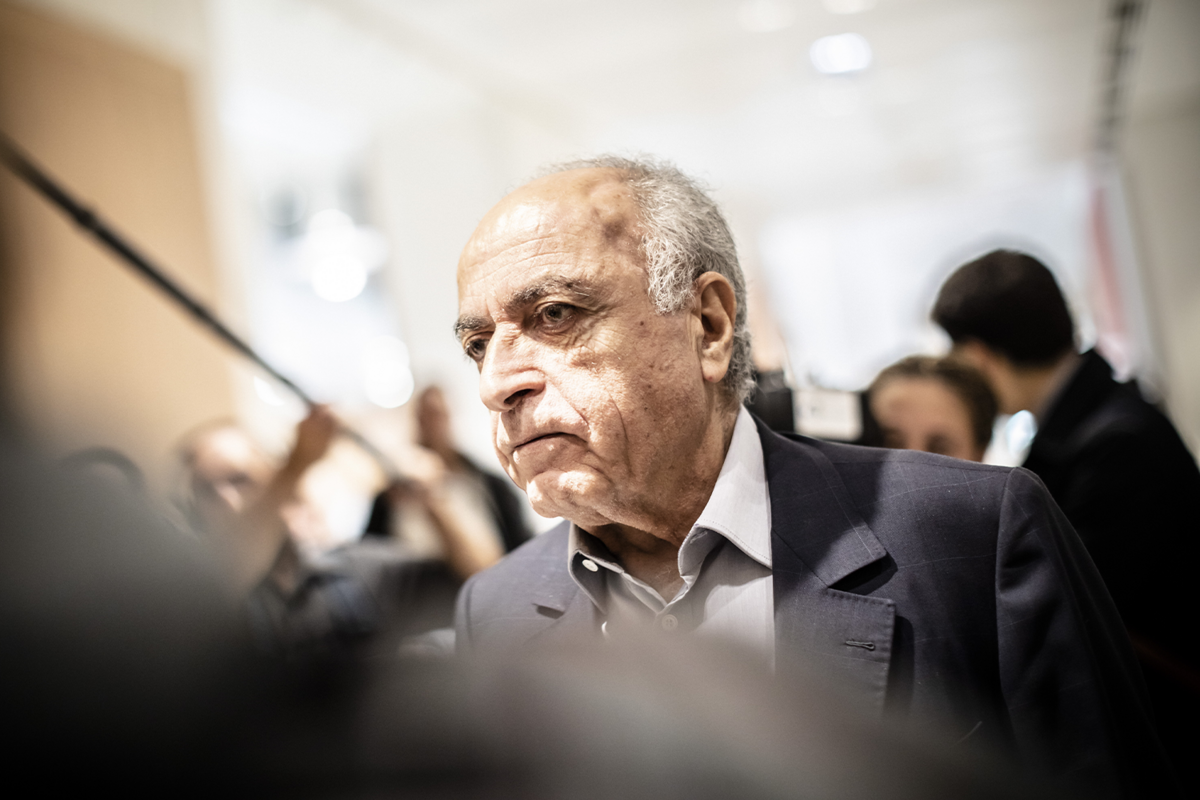Without doubt, his declarations, his threats and his tantrums long haunted the sleep of Nicolas Sarkozy and a few others. He will make no more such threats or declarations. On September 23rd, just two days before a French court's verdict in the Libyan election funding case, the middleman Ziad Takieddine died at a hospital in Beirut, at the age of 75.
His lawyer Élise Arfi told Mediapart that, according to Takieddine's family, his health had deteriorated over the past two weeks, but the exact cause of death is not yet known.
Ziad Takieddine had left France in June 2020 after being sentenced to five years in jail in the Karachi affair, a case involving money misappropriated from French arms sales that was then channelled back into France. His sentence was upheld on appeal in January 2025.
At the end of March this year, France's financial crimes prosecution unit, the Parquet National Financier (PNF), had called for him to receive a six-year jail term and a fine of 3 million euros in the Libyan funding case, in which he was one of the key players. At the time he was subject to an international arrest warrant, but remained protected in Lebanon, which does not extradite its nationals.

Enlargement : Illustration 1

His death could yet affect the timing of the court verdict in the Libyan case, which is due this Thursday. A judicial source says several outcomes are possible: the court could choose to postpone its ruling until an official death certificate is produced. It could also detach Takieddine’s case from the proceedings and still give its ruling on the remainder. However, if a death certificate arrives by Thursday through diplomatic channels, the court could reopen the hearing, hear the parties again, close the hearing once more, and then hand down its verdict.
Born June 14th 1950 in Baakleen, Lebanon, where he is due to be buried this Thursday, Ziad Takieddine came from a large Druze family. He often said his grandfather had been a regional governor under the Ottoman Empire, his uncle an ambassador and his father a top civil servant.
After studying economics at Beirut University, then at Reading University in England, Ziad Takieddine first worked in advertising, for Young & Rubicam. He then became director of the Isola 2000 ski resort in the French Alps. It was there he met his wife, with whom he had two sons, born in 1989 and 1996, before their divorce in 2007.
In the 1990s, Ziad Takieddine turned his attention to the arms trade and, in particular, the secretive deals that often surround this very lucrative line of work. His closeness to François Léotard, defence minister in the government of prime minister Édouard Balladur (1993-1995), propelled him into the heart of what became the Karachi affair, a scandal over secret commission payments linked to French state arms sales to Pakistan and Saudi Arabia.
The death of Ziad Takieddine thus means that a major bag carrier has gone. Back in 1994 he had been caught at the Swiss border with 500,000 francs in cash, just before Balladur's campaign to be president; he was then stopped at Le Bourget airport near Paris in 2011 carrying 1.5 million euros in cash, having arrived on a private jet from Libya.
In the service of Sarkozy's close allies
In the early 2000s, Ziad Takieddine drew close to Nicolas Sarkozy's inner circle, for whom he became a flamboyant go-between with the Saudi regime, then with the Libyan dictator Muammar Gaddafi. “At the time, there was no reported criticism. He [Ziad Takieddine] was not shady. He was well-established. He met Lebanese, French political figures, and journalists. I opened doors for him. It was my role to meet people who had plans,” former minister Brice Hortefeux said during the Libyan affair trial.
He, along with fellow rightwing politician Jean-François Copé, had been very close to the middleman, before keeping their distance when his legal entanglements became toxic.
At the height of his glory in this behind-the-scenes role in the machinations of state, Ziad Takieddine held assets valued at 100 million euros, including a vast townhouse near the Trocadéro complex in Paris, a house in London, a yacht, cars and many offshore accounts.
In his statement on January 13th to the Paris court, Nicolas Sarkozy tried to maintain his distance from the middleman, even calling him a “piglet”. But when he met him in 2003, he said, he was a “very elegant man”, “well-established”, and “not yet the madman he later became”. But Sarkozy found him “unlikeable” and never “took to him”. “I may be the only person who doesn't have a photo with him,” the former president said in his defence.
“Mr Hortefeux did not know Takieddine through me. I never asked Brice to meet him. He had private ties with him that he did not tell me about,” Sarkozy also said. And he said his one-time chief of staff Claude Guéant “did not report” to him. The court showed scepticism over these claims, with the former president giving the strong impression that he was cutting himself off from those who were once his most loyal aides.
In 2004, Ziad Takieddine was the victim of a strange accident on the Caribbean island of Mustique, which he always claimed was an attempt on his life linked to Middle Eastern arms deals.
He was well-established. He met Lebanese, French political figures, and journalists. I opened doors for him.
In court, Ziad Takieddine’s records and all the traces of his secret missions to Tripoli were one of the pillars of the case against Sarkozy’s team, led by Claude Guéant, chief of staff then secretary general at the Élysée, and Brice Hortefeux, a close friend and aide of the former president.
In their final report, prosecutors had thus pointed to Ziad Takieddine’s role in the alleged corruption deal struck by Sarkozy’s team with the Libyan dictatorship. These charges were denied by the accused.
According to the prosecution, the court hearings nonetheless showed that it was Takieddine who took Claude Guéant and Brice Hortefeux to meet Abdullah al-Senussi, Muammar Gaddafi’s brother-in-law, who had been sentenced in absentia in France to life imprisonment over the September 1989 UTA DC-10 airliner bombing. This was before Libyan funds were then sent to help pay for Nicolas Sarkozy’s 2007 presidential bid, the prosecution said.
Takieddine also oversaw the attempt by Sarkozy’s team to ease the legal issues faced by Senussi, who was still the subject of a French arrest warrant.
And it was the middleman who had received and transferred funds sent by the Libyans to a Bahamas account held by one of Nicolas Sarkozy’s old aides, Thierry Gaubert.
False retraction
For the PNF prosecutors, Ziad Takieddine was the “true linchpin of the corruption pact, a middleman in the Franco-Libyan links, who concluded the corruption deal and who moved corrupting funds through complex financial circuits whose sole aim was to hide the source or true recipient of these flows”.
Ziad Takieddine’s last appearance in public was on November 11th 2020, when French news channel BFMTV broadcast his false retraction in the Libyan case. The clip showed Ziad Takieddine, sat on a bench by the sea, clumsily changing his witness account. A subsequent French judicial investigation into alleged witness tampering showed that he had been promised 3 million dollars to backtrack on his statements and to try to clear Nicolas Sarkozy, after having accused him for so long.
The media fixer Michèle Marchand, several businessmen with colourful reputations, and also Nicolas Sarkozy and his wife Carla Bruni, have been placed under investigation in this case for being a “beneficiary of witness tampering ” and over a “criminal conspiracy” to deceive the judges in the case. This case, which is still being investigated, is independent of the Libyan funding affair itself.
“He's a fake repentant, let's be clear, this guy has no credibility,” said his most bitter enemy, the middleman Alexandre Djouhri, whose own testimony raised question marks during the Libyan funding trial, in which he, too, is a defendant.
In recent years Ziad Takieddine had taken refuge at his sister’s home in Lebanon and had built up debts. He had been jailed more than once, often after legal action from lawyers seeking unpaid fees.
--------------------------------------------------------------------------------
- The original French version of this report can be found here.
English version by Michael Streeter



